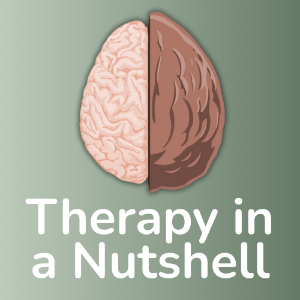
Therapy in a Nutshell
27 Favorites
I’m Emma McAdam, a Licensed Marriage and Family Therapist and my mission is to make mental health resources more easy to access. I take therapy skills and psychological research and condense them down into bite-sized nuggets of help.
I’m here to spread the message that while mental illness is real, it’s common, it’s debilitating, it’s also treatable. There are dozens of research-backed approaches to treating depression, anxiety, and other mental illness. Change, growth, and healing are possible. Please keep courage! Try one little thing every day to improve your life and health and things can get so much better!
Therapy in a Nutshell, and the information provided by Emma McAdam, is solely intended for informational and entertainment purposes and is not a substitute for advice, diagnosis, or treatment regarding medical or mental health conditions. Although Emma McAdam is a licensed marriage and family therapist, the views expressed on this site or any related content should not be taken for medical or psychiatric advice. Always consult your physician before making any decisions related to your physical or mental health.
Therapy in a Nutshell and it’s logo are Registered Trademarks of Therapy in a Nutshell, LLC
Location:
United States
Description:
I’m Emma McAdam, a Licensed Marriage and Family Therapist and my mission is to make mental health resources more easy to access. I take therapy skills and psychological research and condense them down into bite-sized nuggets of help. I’m here to spread the message that while mental illness is real, it’s common, it’s debilitating, it’s also treatable. There are dozens of research-backed approaches to treating depression, anxiety, and other mental illness. Change, growth, and healing are possible. Please keep courage! Try one little thing every day to improve your life and health and things can get so much better! Therapy in a Nutshell, and the information provided by Emma McAdam, is solely intended for informational and entertainment purposes and is not a substitute for advice, diagnosis, or treatment regarding medical or mental health conditions. Although Emma McAdam is a licensed marriage and family therapist, the views expressed on this site or any related content should not be taken for medical or psychiatric advice. Always consult your physician before making any decisions related to your physical or mental health. Therapy in a Nutshell and it’s logo are Registered Trademarks of Therapy in a Nutshell, LLC
Language:
English
Website:
https://tinpodcast.podbean.com
The Freeze, Appease or Fawn Response to Sexual Violence
Duration:00:20:12
What is IFS? No Bad Parts Book Summary - Trauma Therapy
Duration:00:26:40
How to "Lean In" to Feelings - Anxiety Meditation w/ Thomas McConkie
Duration:00:30:41
Rebuilding Healthy Attachment Relationships after Childhood Trauma or CPTSD
Duration:00:17:28
Why do I feel so numb? Why can't I cry? Working through Emotional Numbing and Dissociation
Duration:00:15:14
Trauma Fueled Nightmares and Night Terrors with PTSD
Duration:00:12:58
Improving Body Image w/ a Somatic Approach, and Deb Schachter
Duration:00:47:28
Complex PTSD: From Surviving to Thriving by Pete Walker -Book Summary about Healing Childhood Trauma
Duration:00:25:18
6 Deep and Lasting Ways to Improve Your Self-Esteem
Duration:00:15:33
Connectability with Anna Runkle
Duration:00:50:05
Restoring your Internal Sense of Safety after Trauma w/ CPTSD Expert Dr. Arielle Schwartz
Duration:01:05:22
Armoring - How Trauma Gets Embodied as Tension, Chronic Pain, Jumpiness or Emotional Walls
Duration:00:19:33
Healing from Childhood Trauma - w/ Past Tense Author Sacha Mardou
Duration:00:40:42
A nerdy deep dive into ADHD and Anxiety
Duration:00:29:40
How to Feel your Feelings: Step-by-Step Exercise and full debrief w/ Thomas McConkie, Mindfulness
Duration:00:43:23
9 Micro Habits for Self-Regulation of Trauma or Anxiety
Duration:00:19:11
Stuck in the Freeze Response? How to convert Toxic Stress into Healthy Action #teamwater
Duration:00:14:58
Emotional Flashbacks - 13 Strategies for Childhood Trauma from Pete Walker's book on CPTSD
Duration:00:17:57
When it feels like Anxiety, but it's actually ANGER w/ Dr. Sarah Michaud
Duration:00:51:01
Harm OCD - Intrusive Thoughts that I Might Hurt Someone
Duration:00:18:40